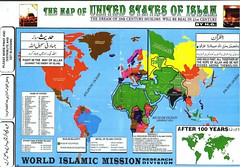While watching a video of an anti-Israel hate speech shot at UC Irvine and posted on
Little Green Footballs yesterday, I was reminded of the whole "Iraq Cakewalk" debate. At one point in the video, Amir-Abdel Malik-Ali states: "Richard Perle, you know, the Neocons and Zionist Jews who were in the Pentagon who actually got George Bush to go into Iraq, they told George Bush this will be a cakewalk." Aside from its revolting anti-Semitism, Malik-Ali's statement is another example of how widely accepted this "cakewalk" lie has become.
The "cakewalk" assertion is often attributed to Rumsfeld. Neither he nor Perle ever said Iraq would be a cakewalk, and Rumsfeld repeatedly stated that he disagreed with that assessment. In fact, General Richard Meyers and Rumsfeld held a press briefing in December of 2002 at which they specifically stated that a war in Iraq would
not be a cakewalk.
CNN's report on the briefing, posted on December 18, 2002, carried the headline: "U.S. officials: Iraq war no 'cakewalk'." Strangely, the article doesn't come up through a CNN search, but a Google search uncovered the link. Go figure. Couldn't turn up any article on the briefing in the
New York Times archives either. I've got the CNN article as a PDF file in case the page is just cached somehow and vanishes in a week.
Here is an excerpt from the transcript of the
Defense Department's December 17, 2002, press briefing:
Q: We keep hearing from some military analysts, military experts that war with Iraq might be a cakewalk, that in fact they might -- the Iraqi forces might fold very quickly. How does that square with your assessment of how war with Iraq might go?
Rumsfeld: Well, Dick Myers and I have both responded from this podium that that's, in our view, not the way to look at this situation. First of all, any war is a dangerous thing, and it puts people's lives at risk.
And second, I think that it is very difficult to have good knowledge as to exactly how Iraqi forces will behave. A part of it will depend on a whole series of things, in the event they were to evolve and occur, that could affect their behavior favorably or unfavorably. And since those things we can't predict -- first of all, we don't know what the president will decide or what anyone else will decide, if there will be a use of force. But if there were to be such a decision, it's not knowable in what the context might be. And that would affect, one would think, how Iraqi forces would behave.
We do know that in a matter of hours some 60[,000], 70[,000], 80,000 [Iraqis] -- not hours, maybe days; it was two or three days -- dropped their weapons and surrendered very quickly in the Desert Storm. What would happen this time is an entirely open question.
Q: Mr. Secretary --
Rumsfeld: Do you want to answer that?
Myers: I would just say there's nobody involved in the military planning, to include the secretary or any of the senior leadership in this building, I think, that you'll find, that would say that this sort of endeavor, if we were asked to do it, would be a cakewalk. I mean, it's just not how we characterize it.
So who did say the Iraq war would be a cakewalk? Well, that would be Ken Adelman, who worked for Rumsfeld for two years during the Ford administration. He wrote a
piece in the Washington Post in February of 2002 stating that he personally believed the war would be a cakewalk. Adelman is now a member of the Pentagon's Defense Policy Board Advisory Committee, though it is not clear whether he held that position at the time of the article. His opinion was never represented as Bush administration or Defense Department policy or belief. In fact, as the
transcript of the press briefing shows, Meyers and Rumsfeld clearly rejected Adelman's view.
There is certainly reason for criticism of the planning of the war, in particular regarding the bizarre decision to let lawlessness prevail after the fall of Saddam Hussein's regime. Resorting to dishonesty, however, discredits the critics.
On a lighter note, here is an
explanation of the origins and history of the term "cakewalk," from early voguing to pugilism to the most famous thing Rumsfeld never said.

